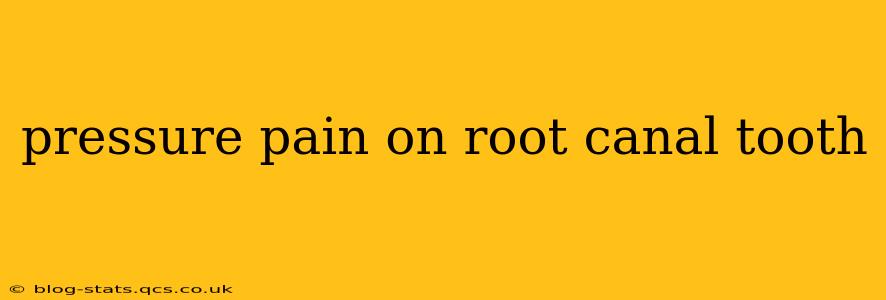Experiencing pressure pain in a tooth that's already had a root canal can be concerning. While root canals are designed to eliminate infection and pain, persistent or new discomfort warrants attention. This comprehensive guide explores the potential causes of pressure pain after a root canal, helping you understand your situation and take appropriate action.
Why Do I Still Have Pain After a Root Canal?
This is a common question, and the answer isn't always straightforward. A successful root canal eliminates the nerve, theoretically removing the source of pain. However, several factors can still cause pressure or discomfort:
- Incomplete Root Canal Treatment: Sometimes, infection or inflammation might persist due to an incompletely cleaned or filled root canal. This is less common with experienced endodontists but still a possibility.
- Secondary Infection: A new infection can develop after the initial procedure, potentially from bacteria entering the tooth through a crack or leak in the filling material.
- Fractured Tooth: A crack in the tooth, either existing before or developing after the root canal, can create pressure points and pain. This is especially true if the crack extends to the root.
- Periapical Abscess: This is a pocket of pus at the root tip of the tooth, a sign of ongoing infection that may require further treatment. Often accompanied by swelling and throbbing pain.
- Sinus Infection: Pressure from a sinus infection can sometimes be felt as tooth pain, particularly in the upper molars.
- Gum Disease (Periodontitis): Severe gum disease can cause inflammation and pressure that might be mistaken for root canal related pain.
- Improper Bite: If your bite is off, it can put extra pressure on the treated tooth leading to discomfort.
- Temporary Filling Issues: A temporary filling might not be properly sealed, allowing irritants to reach the tooth and cause pressure.
What Should I Do if I Have Pressure Pain in My Root Canal Tooth?
Ignoring persistent pain is never a good idea. Here's what you should do:
- Contact Your Dentist or Endodontist Immediately: Don't hesitate to schedule an appointment. They can properly diagnose the problem and determine the best course of action.
- Over-the-Counter Pain Relief: While waiting for your appointment, over-the-counter pain relievers like ibuprofen or acetaminophen can help manage discomfort. However, these are only temporary solutions.
- Avoid Chewing on the Affected Tooth: This will prevent further irritation and potential damage.
How Is Pressure Pain After a Root Canal Treated?
Treatment depends entirely on the cause:
- Retreatment: If the root canal was incomplete or a new infection has developed, a retreatment might be necessary. This involves re-cleaning, shaping, and refilling the root canals.
- Apicoectomy: For persistent infections at the root tip, an apicoectomy might be recommended. This surgical procedure removes the infected portion of the root.
- Extraction: In some cases, if the tooth is severely damaged or the infection is uncontrollable, extraction might be the best option.
- Crown: If the tooth is weakened, a crown will be necessary to protect it.
- Addressing other issues: Treatment for sinus infections, gum disease, or bite problems may be needed depending on the identified cause.
Can a Root Canal Fail?
Yes, a root canal can fail, though it’s not common. Failure often manifests as persistent or recurring pain. Factors contributing to failure include:
- Unidentified or Untreated Canals: The initial procedure might have missed one or more root canals.
- Persistent Infection: A lingering infection may not have been fully eradicated.
- Fractured Tooth: A crack in the tooth compromises the success of the root canal.
How Long Does Pressure Pain After a Root Canal Typically Last?
Mild discomfort or pressure for a few days after the root canal procedure is usually expected. However, persistent or increasing pain after a week or more signals a potential problem. Contact your dentist immediately if the pain doesn't subside or worsens.
When Should I Worry About Pressure Pain After a Root Canal?
Worry if the pain:
- Is severe or worsening: Increasing intensity suggests an ongoing problem requiring attention.
- Is accompanied by swelling: Swelling indicates potential infection.
- Persists for more than a week: Lingering pain beyond a week warrants a dental check-up.
Remember, seeking professional dental care promptly is crucial for resolving pressure pain after a root canal. Early intervention usually leads to the most effective and successful outcome. This information is for general knowledge and does not constitute medical advice. Always consult with a dental professional for any concerns about your oral health.
